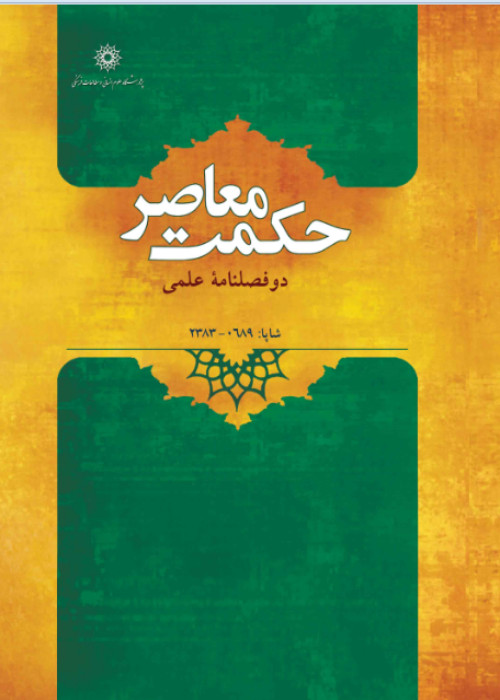The Impact of Neo-Platonic Ideas about “Participation” and “Emanation” on Rūzbahān Baqlī Shīrazī’s Notion of “Iltibās”
In the current research, writers aim to specify that Ruzbahan has used "Eltebas" with the meaning that "Plotinus" have used emanation. "Eltebas" is a Peculiar Lexicon in Ruzbahan Baqli-e-Shirazi's Intellectual System. He has Used This Metaphorical Title for naming appearance of God. In his point of view, due to Eltebas, right, appears in the universe. This Thought has been seen previously in Greece philosophy, especially in Plato & Plotinus 'ideas have entered Islam world via translation of his work, companionship with Christians,…and had had an impression on intellectual stream of the Islam World. Ruzbahan's ideas about the relationship between creator & creatures are close to Plato& Plotinus's ideas in a way that they have the same allegory.By considering cultural exchanges between East & west Mediterranean it has to be said that this similarity is in a way that it proves that Ruzbahan had been impressed with these Greek philosopher. And it's not false to call him "Neo-platonic".Muslims were familiar with Plato’s (347 BC) name, his beliefs, and his works, but Plotinus (270 CE) does not appear in their work. In certain works of Islamic philosophy as well as those of sects and creeds, a person is mentioned as “the Greek master.” In contemporary scholarships, it has been determined that this person was Plotinus (see Badawi 1955:1). The Greek master is mentioned in Ṣiwān al-ḥikma, Al-ḥikmat al-khālida and Al-milal wa-l-niḥal, where some of his remarks are cited. The author of Al-ḥikmat al-khālida refers to the Greek master as having a particular philosophy, although he does not refer to his main beliefs (see Miskawayh 1358:216). It should be acknowledged that “in the history of Islamic philosophy, Plotinus was undoubtedly one of the most influential Greek philosophers, who was directly or indirectly considered throughout the history of philosophy in Islam” (Pourjavadi 1378:98). Some scholars have gone so far as to suggest that he is at least as influential as Aristotle (322 BC): “his influence in the Islamic thought is not by any means less than that of Aristotle” (Badawi 1955:2).Of Plotinus’s work, his Enneads (nine essays) is available to us. Summaries of the fourth, fifth, and sixth essays were translated into Arabic in the third century AH (ninth century CE) under Theologia. In this research, this work is more important than Enneads, because Muslims learned about Plotinus’s views through this Arabic translation. The essay was translated by a Christian scholar ‘Abd al-Masīḥ ibn ‘Abd Allāh Nā‘ima al-Ḥimṣī(third century AH). The work was misattributed to Aristotle (see Badawi 1955:1-18). It should be noted that Muslims’ acquaintance with Plotinus’s doctrines was not limited to Theologia. In fact, “they were familiar with the work of other Neo-Platonists, particularly Pyrphyry and Proclus” (Pourjavadi 1387:104). With these preliminaries and having in mind that a sort of unity in creation is articulated in the work translated from Plotinus and his studies into Arabic, it can be said that the most prominent impact of Plotinus on Muslims is where the theory of the unity of existence is developed (see O’Leary 1374:42). Plotinus says there is no doubt that we should not talk about observations, but about the observer and the observed, and one should dare talk about the pure unity (Stace 1388:243). On this account, it should be acknowledged that, in addition to Muslim philosophers, Islamic mysticism, particularly beauty-centered mysticism, is influenced by Plotinus’s doctrines.
Methodology and Material:
The method of research here is based on historical method and content analysis. We first examined data about how the Greek intellectual heritage, particularly that of Plato and Plotinus, was transmitted to eastern neighbors of Greece and Rome. We have then examined the understanding of eastern intellectuals, particularly Rūzbahān Baqlī Shīrāzī. It is noteworthy that, of different dimensions of the impact of the heritages of Plato and Plotinus, this research focuses on the relation between the one and phenomena. We conclude that Rūzbahān was influenced by Plotinus’s views.
A problem raised in Plato’s and then in Plotinus’s philosophy is whether the Monad (the unified essence) is related with creatures? In discussions of his theory of Forms, Plato has deployed the metaphor of “participation” (methexis) in answering the question. This was strongly opposed by his student Aristotle. Later, Plotinus combined their views to provide a more rational structure of the issue. He explains the presence of the “one” in the world by drawing upon the metaphor of “emanation” or “issuance.” Plotinus likens the one to a bright volume from which light and warmth emanates involuntarily and without it undergoing a diminution or multiplicity. In this way, he describes how the one is related with other stages of creation. With this revision, Plato’s view found a less flawed form in Neo-Platonic philosophy.Rūzbahān Baqlī Shīrāzī (606 AH/1209 CE) was influenced by Plotinus’s doctrines. In his work, he was inspired by Neo-Platonic theology. An investigation of this reveals the great extent to which beauty-oriented mystics were influenced by Greek philosophical theology. For this reason, it is necessary to specify different dimensions of this influence. The outline of Rūzbahān’s intellectual system led him to offer an answer to the problem of the relation between the creator and creatures in line with his religious beliefs. He portrays the original creation in the same way as Neo-Platonic philosophers. He suggests that the creation is constituted by necessity and the principle of emanation, but instead of equivalents of “emanation” or “issuance,” he uses the term “iltibās” (clothing). (Baqlī Shīrāzī 1389:53-54)
Drawing upon the notion of “participation,” Plato tried to argue that creatures participate in the divine essence. Thus, the world was portrayed as a fundamental unity, despite its multiplicity. Just like Plato, Plotinus believed in unity in multiplicity. Plato recognized that there is a separation between the worlds of ideas and senses in Plato’s view, Plotinus deployed “issuance” or “emanation” in his theory. In his view, the world results from the issuance of the one, where issuance does not lead to diminution, multiplicity, imperfection, and the like. Unity in multiplicity was characteristically acceptable to Muslims, as it was based on Quranic doctrines. The theory was deployed by philosophers and then mystics.Rūzbahān is obviously influenced by Plotinus’s theory. In his view, the creation of the world begins from God, and then ends in reason, spirit, and finally matter. The process is explained in line with Plotinus’s philosophy in his ‘Abhar al-‘āshiqīn and Sharḥ shaṭaḥiyyāt. In contrast to emanation, he uses the term iltibās. He views the mundane world as the abode of iltibās, which is God’s manifestation in the world. In other words, God’s iltibās is the manifestation or revelation of divine essence in sensible things. This is inevitable in the course of creation. On this account, Rūzbahān’s description of the creation of the world corresponds to Plotinus’s doctrines as they are generally received in the Islamic world, which indicates Rūzbahān Baqlī Shīrāzī’s evident influence from Plotinus’s views. Rūzbahān should, thus, be deemed a Neo-Platonic philosopher.
- حق عضویت دریافتی صرف حمایت از نشریات عضو و نگهداری، تکمیل و توسعه مگیران میشود.
- پرداخت حق اشتراک و دانلود مقالات اجازه بازنشر آن در سایر رسانههای چاپی و دیجیتال را به کاربر نمیدهد.



